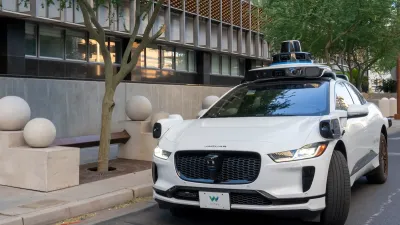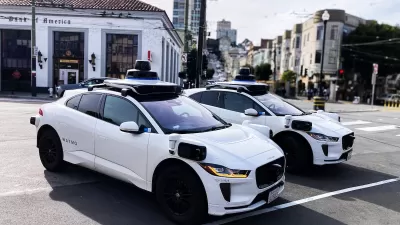As autonomous vehicles prepare to disrupt transportation systems, Ford Motors President & CEO Mark Fields, L.A Chief Sustainability Officer Matt Petersen, and rideshare company Chariot co-founder Ali Vahabzadeh opine on tomorrow's mobility ecosystem.
The recent Los Angeles Auto Show and the related AutoMobility LA trade show in November brought together the leading minds of the automotive and tech industries to share their vision for transportation in the future. Public and private cooperation and collaboration was the top theme highlighted by the leaders from Ford Motors, the recently launched Chariot rideshare, and Los Angeles City Hall.
In an excerpt published in The Planning Report, Ford Motors CEO Mark Fields described how the move to integrate cloud technology has done more than increase the capabilities of bluetooth or assist with breaking around other objects. In providing an overview of the technological advances that are now becoming known as purely 'internet-on-wheels,' Fields explained "all of this will help us unlock the future of transportation systems. Beginning next year, we’ll be directly engaging with city leaders, tech visionaries, urban planners, designers, and local communities—bringing public and private together to discuss and develop solutions for transportation systems that can improve people’s lives in ways that we can only just begin to imagine."
Solving urban cities traffic issues was the focus of LA Chief Sustainability Officer Petersen, who is charged with reducing vehicle emissions and finding creative solutions to reduce dependance on gasoline-powered vehicles. Petersen, who spearheaded the first ever Sustainable City pLAn, explained that Los Angeles is now up to 1200 publicly available EV-charging stations and is on the way to 1500. Los Angeles city leaders are also rolling out EV car sharing for disadvantaged communities—the first of its type in the world—scheduled to begin sometime in 2017.
Petersen pointed out that as vehicle fleets continue to become more connected, our savvy vehicles will just be programed to take advantage of excess solar power on the grid and will act as a support system to the Southern California electrical grid throughout the day's varied energy demand.Solving urban transportation problems is something Ford is also up to the task on. Ford Motors, who recently made a significant investment in the San Francisco Bay Area's bikeshare program, is taking a holistic approach to solving mobility challenges. Fields opined, "as we think about the future world, we think deeply about the conflicting needs in the city. They want more capacity to get the flow of people being able to live their lives. At the same time, they want to reduce pollution and reduce congestion."
FULL STORY: Envisioning A Realistic City of Tomorrow Mobility Ecosystem

Planetizen Federal Action Tracker
A weekly monitor of how Trump’s orders and actions are impacting planners and planning in America.

Congressman Proposes Bill to Rename DC Metro “Trump Train”
The Make Autorail Great Again Act would withhold federal funding to the system until the Washington Metropolitan Area Transit Authority (WMATA), rebrands as the Washington Metropolitan Authority for Greater Access (WMAGA).

The Simple Legislative Tool Transforming Vacant Downtowns
In California, Michigan and Georgia, an easy win is bringing dollars — and delight — back to city centers.

The States Losing Rural Delivery Rooms at an Alarming Pace
In some states, as few as 9% of rural hospitals still deliver babies. As a result, rising pre-term births, no adequate pre-term care and harrowing close calls are a growing reality.

The Small South Asian Republic Going all in on EVs
Thanks to one simple policy change less than five years ago, 65% of new cars in this Himalayan country are now electric.

DC Backpedals on Bike Lane Protection, Swaps Barriers for Paint
Citing aesthetic concerns, the city is removing the concrete barriers and flexposts that once separated Arizona Avenue cyclists from motor vehicles.
Urban Design for Planners 1: Software Tools
This six-course series explores essential urban design concepts using open source software and equips planners with the tools they need to participate fully in the urban design process.
Planning for Universal Design
Learn the tools for implementing Universal Design in planning regulations.
Smith Gee Studio
City of Charlotte
City of Camden Redevelopment Agency
City of Astoria
Transportation Research & Education Center (TREC) at Portland State University
US High Speed Rail Association
City of Camden Redevelopment Agency
Municipality of Princeton (NJ)





























